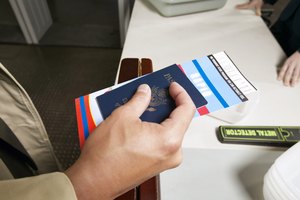Do You Have to Have the Signature of a Divorced Spouse to Take Your Minor Child Out of the Country?
By Cindy Chung

Digital Vision./Photodisc/Getty Images
A divorced parent may want to take a child on trips and vacations outside the United States without the other parent's involvement or permission. However, international travel with a child may require consent from the other parent. Travel without the other parent's consent may result in an international child abduction case or other legal consequences. Parents should know their rights established by their divorce decree and understand the relevant state and federal laws regarding travel with children.
Terms of Custody Order
The divorced parents' custody arrangement often determines each parent's rights to act without the other parent's consent. If parents share custodial rights through joint legal custody, each parent generally has a right to oppose major decisions related to the minor child's life. For example, a parent with custodial rights may be able to oppose the other parent taking a child out of the country for a trip or for relocation. In addition, the terms of the parents' divorce decree may specifically restrict travel or relocation without the consent of both parents. If the other parent opposes the international travel, a parent planning to travel may need to obtain a court order.
Requirements for Passport Issuance
To travel abroad, a child requires a passport. U.S. laws regarding passport issuance require both parents' signatures on the application form submitted on behalf of a child under the age of 16. Both parents must appear in person to apply for their child's passport. If only one parent can appear in person to apply for the child's passport, the other parent may provide a signed consent form. If only one parent would like to apply for the child's U.S. passport and the other parent does not agree, the parent applying for the passport generally must show a court order confirming sole custody of the child. However, a child who qualifies for dual citizenship may receive a foreign passport in addition to a U.S. passport. The U.S. Department of State does not oversee the application procedures and passport issuance laws of other nations.
Letter of Consent for International Travel
The U.S. Department of State suggests that a parent who plans to travel abroad without the child's other parent obtain a letter of consent. The entry and departure requirements for travelers often vary from one airport to another and from one destination to another. Under some circumstances, an airline employee or immigration official may ask to see signed consent from the child's other parent before allowing a child to leave the country.
Consequences of Travel without Parental Consent
If a divorced parent takes a child out of the country without the other parent's consent, the other parent may be able to open an international parental child abduction case. The U.S. Department of State handles international child kidnapping through the Office of Children's Issues. In addition, a custodial parent may need to file a local police report and ask law enforcement to enter the minor's information into the National Crime Information Center, a federal database. The parent may also benefit from consulting with a family law attorney about enforcing the custody terms of the divorce decree.
References
- American Bar Association: Custody and Visitation
- U.S. Department of State: Prevention: Guarding Against International Parental Child Abduction
- U.S. Department of State: Passport Issuance and Denial to Minors Involved in Custody Disputes
- U.S. Department of State: Passports: Minors Under Age 16
- U.S. Department of State: Letter of Consent for Travel of a Minor Child
- U.S. Department of State: Opening an International Parental Child Abduction Case
Resources
Writer Bio
Cindy Chung is a California-based professional writer. She writes for various websites on legal topics and other areas of interest. She holds a B.A. in education and a Juris Doctor.